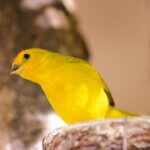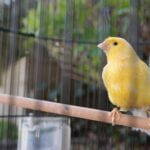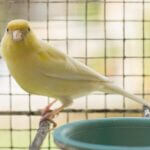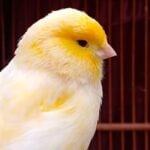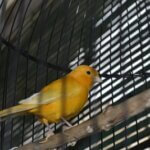Last Updated on: 24th November 2022, 03:06 pm
Canaries must drink water throughout the day to survive. Due to their small size and fast-paced metabolism, they need to drink proportionately more often than larger animals.
So, most owners are concerned about their canaries failing to drink enough water. It’s rare for there to be a problem with your canary drinking too much water.
However, your canary might remain steadfastly by its water bowl and constantly take sips as if it can’t get enough. Over-hydration can be just as damaging as dehydration, and anything that makes a canary chronically thirsty is often bad for its health.
So, figuring out why your canary drinks so much water is vital. This may help you find and treat a health problem early or allow you to tweak the canary’s environment, so it doesn’t feel so thirsty.
How Often Should A Canary Drink Water?
The average canary drinks 200-300 milliliters of water daily, about 10 ounces at the high end.
This amount is spread over multiple trips to the water bowl. The canary must replenish itself again as it goes through various metabolic processes.
Canaries are small birds with small stomachs, so they can’t drink all the water they need for the day in a few sessions. That’s why canaries need to have unlimited access to water. They don’t ration it into hard drinking times but take sips whenever the need arises.
If a canary doesn’t have fresh water, it can become dehydrated and even die if it doesn’t drink for more than 24 hours. Of course, this depends on the size and health of the bird. Larger and healthier canaries can survive longer without water, while elderly or sickly birds will perish more quickly.
What Happens When Canaries Drink Too Much Water?
It’s nearly impossible to tell when a canary is drinking too much or drinking little but with greater frequency. Most owners only notice when the water bowl needs to be filled more often than usual.
Over-hydrating is rare for canaries, but it can be motivated by health and environmental factors. However, polydipsia can have serious health implications for your canary.
The most common problem associated with polydipsia in birds is polyuria. According to the Iranian Journal of Veterinary Science and Technology, polyuria manifests in birds as a large volume of urine with changes in opacity and color.
Canaries expel urine and feces at the same time through their cloaca. In a healthy bird, the combined waste forms a thick or solid paste, the color of which may vary.
However, when a canary has polyuria, its droppings will have a large amount of urine, causing it to appear watery. It’s common for new owners to mistake polyuria for diarrhea.
Whereas the stool of a polyuric canary still contains solid fecal matter, the droppings of canaries with diarrhea have a watery consistency.
Other common symptoms of polyuria in canaries include:
- Lethargy
- Weakness
- Loss of appetite
- Ruffled feathers
- Depression
- Anorexia
Why Canaries Drink Too Much Water
Polydipsia and polyuria are treatable conditions, and most birds successfully recover. However, this depends on how early the condition is found and when a vet can intervene.
Likewise, preventing over-hydrating is better than attempting to treat the effects later. Here are the reasons why a canary might drink more water than it should:
Changes in its Diet
The kind of diet your canary eats significantly affects the water it drinks. Introducing your pet to new foods (especially dry or solid foods) might trigger the urge to drink more water. The good news is that your canary’s water intake will return to normal once it begins adjusting to the new diet.
If your canary’s diet comprises too salty foods, it’ll drink much more water than it would. This is a natural way to try and flush out the sodium. If the diet isn’t modified, this could negatively impact the kidneys.
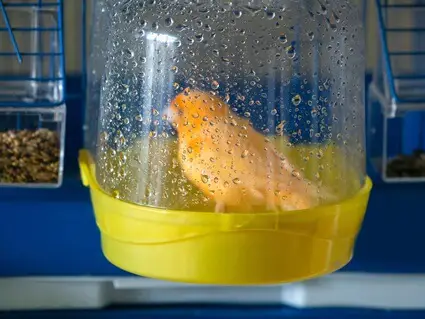
Hot Weather
Canaries are motivated to drink extra water when dealing with hot weather or overheating.
For a warm day, drinking extra water is a healthy reaction that helps the canary stay hydrated and cool down. As long as the canary has shade and water and isn’t exposed to weather above 95-100 degrees Fahrenheit, it should be okay in the short term.
If the canary is overheating, excessive water consumption is a warning sign that you should intervene immediately. The canary won’t be able to hydrate itself fast enough, and its body may begin to shut down, which is likely at temperatures above 104 degrees Fahrenheit.
If so, remove the canary from the hot room or away from the window. Introduce lower temperatures, but don’t change suddenly, as this may cause shock. Allow the canary to drink as much as it desires.
If overheating happens once or twice, the canary will likely recover fully. If regularly exposed to this strain on its body, it can permanently damage its organs, especially its brain.
Feeding Hatchlings
Feeding and caring for newly hatched chicks is energy-intensive. Consequently, she will drink more water than normal to replenish what she’s lost through the breeding, egg-laying, and feeding stages.
A brooding mother will also leave her chicks infrequently, so she may appear thirsty when visiting the water bowl. Also, she’ll need more water to produce liquid in her crop that breaks down the food she stores to regurgitate for the offspring, which requires drinking more often.
Just Exercised
A canary will feel thirsty after it’s exercised. Canaries are active creatures that enjoy flying from perch to perch, playing with toys, or flying long distances if allowed outside of their cage.
If your canary has just finished an intense workout, it’ll have lost water and energy, prompting it to drink a lot of water afterward. This should last a few minutes as the bird cools down.
If it continues beyond this point, the canary may be experiencing health complications that impede its ability to get or stay hydrated.
Ingested Toxins
Canaries have sensitive digestive systems that can be easily upset by toxins. These may come from eating a type of food unsuitable for it, such as apple seeds, or drinking contaminated water.
If your canary has inadvertently ingested a toxic substance, it might drink a lot of water to “wash out” it and ward off any negative side effects.
Health Condition
Of course, organ damage or disease is the worst possible reason for excessive thirst in a canary. The other factors may cause these issues or exist as their problems.
Each condition will need the official diagnosis and intervention of a vet. However, you may be able to guess the possible cause for the excessive thirst based on the symptoms below:
Diabetes
According to Modern Veterinary Practice, diabetes mellitus is commonly reported in small bird species, such as canaries and parakeets. In avians, this condition occurs when there is an overproduction of glucagon by the pancreas.
It’s not entirely clear what causes diabetes in canaries and other birds, but many experts attribute the condition to factors such as:
- Obesity
- High carbohydrate and sugar content in the diet
- Hormonal imbalances
- Genetics
Whatever the cause, the outcome and symptoms are the same. Canaries with diabetes experience chronic thirst and will drink far more water than a healthy canary. Other symptoms of a diabetic canary include:
- Increased frequency of urination
- Weight loss
- Excessive eating
- Bouts of sleepiness
Diabetes in canaries isn’t always possible to identify simply by observing the bird, and that’s because symptoms can overlap with those of other illnesses.
Since there is no cure for diabetes, management of the condition is necessary for the rest of its life. This treatment may involve insulin injections and oral drugs.
If your canary is overweight, your vet might also recommend exercising your canary daily and changing its diet to one that’s low in carbohydrates.
Renal Disease
Birds are susceptible to developing the renal disease, also known as kidney disease. According to Exotic Animal Practice, renal disease in canaries may happen due to the following:
- Congenital defects
- Bacterial, viral, and protozoa infections
- Metabolic disorders
- Intestinal inflammation
Regardless of the underlying cause, renal disease can damage the kidneys and renal system of the affected bird, impairing kidney function. While the condition can affect canaries of all ages, it is most prevalent in older birds.
Canaries with renal disease are likely to urinate more, which causes dehydration and prompts them to drink more water. Renal failure is also characterized by physical and behavioral symptoms, including:
- Weight loss
- Flatulence
- Diarrhea
- Noticeable lumps around the abdomen area
- Constipation
- Swollen abdomen
- Breathing difficulties
- Inability to fly
- Loss of appetite
- Disorientation
In chronic cases of renal disease, the affected canary might have kidney failure, which is fatal.
A vet will conduct a physical examination, which entails feeling your canary’s abdomen for lumps and masses. They may also run a series of medical tests, including a blood test and a urinalysis, to evaluate the condition of the kidneys. After diagnosis, treatment may include:
- Antiviral, antibiotic, or antifungal medications
- Diuretic drugs
- Omega fatty acids
Surgery may be recommended to remove any kidney stones and cancerous tumors. In cases where the disease has progressed too far, and no treatment is feasible, supportive care is often employed to manage the disease. This may include fluid and electrolyte therapy, as well as changes to the diet.


